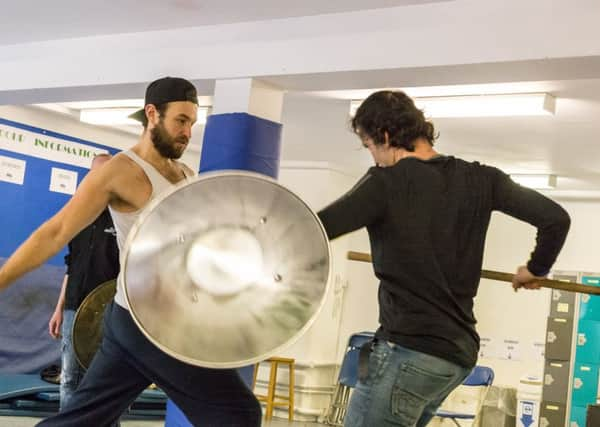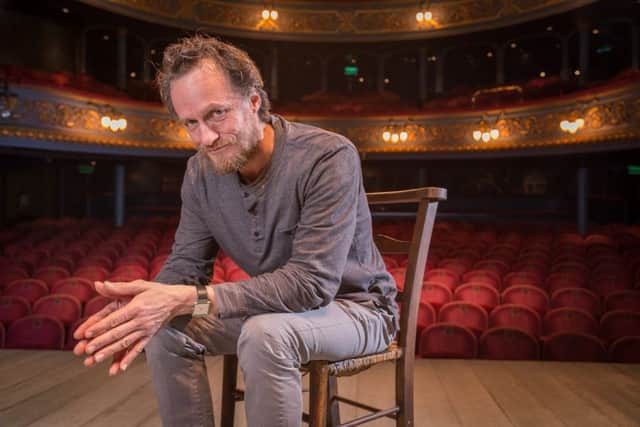The Iliad to herald Royal Lyceum's Mark Thomson's last hurrah


Ten past six on Monday evening, and Mark Thomson is pacing about on the steps of the hotel opposite Edinburgh’s Royal Lyceum Theatre. He’s fresh out of rehearsals for The Iliad, his final show as the Lyceum’s artistic director before he hands over to playwright David Greig; and he’s buzzing with nervous energy, as he describes the thinking behind this latest project, which involves writer Chris Hannan, and an ensemble cast of 12 actors, including Ron Donachie and Richard Conlon – stars of the Lyceum’s recent hugely popular production of The Crucible – and 2016 Olivier award nominee Melody Grove.
“I took this idea to Chris a few years ago,” says Thomson, “and it’s interesting to see that since we first began working on it, many theatres across the UK have also begun to look back to the Greek classics – in fact we’re opening in the same week as the Citizens’ new version of the Oresteia, This Restless House. It’s as if, in a time of global crisis, we have this impulse to look back to the roots of our civilisation – and these works do represent some kind of root. In the case of The Iliad, it’s simply that this is a great poem about war; and above all, about how we stop this – how, having entered into conflicts, we can somehow overcome all the forces that drive us to continue.”
Advertisement
Hide AdA show on the scale of The Iliad seems like a fitting conclusion to Mark Thomson’s 13 years in the job, which began in 2003, soon after East Lothian council stopped funding the producing company at the Brunton Theatre in Musselburgh that Thomson had directed for the previous six years, following an early career as an assistant director at Nottingham Playhouse, the Theatre Royal Stratford East, and the Royal Shakespeare Company. Thomson was only 38 when he landed the Lyceum job, a working-class lad from Lanarkshire who had worked his way into the world of theatre with a formidable combination of talent, energy and passion.


Yet over his time at the Lyceum, the theatre has created almost 100 new productions, of which Thomson himself has directed more than 30, ranging from brand-new Scottish plays – Des Dillon’s Six Black Candles back in 2004, for example, or DC Jackson’s Kill Johnny Glendenning in 2014 – to some memorable classic revivals, including his superb, hard-hitting 21st century take on Brecht’s Caucasian Chalk Circle, early last year. He has also forged powerful relationships with a small group of visiting directors, including the internationally acclaimed John Dove, whose exquisite revivals of classics by Arthur Miller and Brian Friel rapidly became a highlight of every Lyceum season. And although Thomson’s time at the Lyceum has sometimes been something of a roller-coaster, ranging from huge success to relative disaster in a single season, his successor David Greig says he’s increasingly impressed with the sheer sweep of what’s been achieved, over the past dozen years.
“Mark’s had a remarkable tenure, I think,” says Greig. “He’s covered new plays, classics and revivals. He’s kept the Lyceum as a major producing house in the UK. He’s been a very generous gatekeeper, and he’s had an eye on curating the wider culture of Scotland. And he’s managed to achieve all this against a funding backdrop that’s got tougher and tougher. The more I get close to the role, the more I admire what Mark’s achieved, both on stage and off; and I think he’s going to be a very tough act to follow.”
For Thomson himself, though, it’s all still about a love-affair with the beautiful Victorian theatre itself, and with his passion for overcoming its image as a stately and slightly forbidding establishment building.
“It can be a difficult theatre, no question,” says Thomson, “and downright unforgiving if you don’t respect its architecture and character. But it’s absolutely not about being conservative in your approach, or too reverent – far from it. What I’ve learned about the Lyceum is that it’s a theatre that responds to big stories and big ideas, particularly when they’re presented by actors who come right forward and enter into the intimate human relationship with the audience that that space makes possible. And I hope The Iliad will be a great show in that tradition, big, and challenging, and full of humanity.”


And what’s next for Thomson? A few months of rest and thought, he says, after 13 years in a hugely taxing job. It’s possible that he will start to write again; before the Lyceum years, he wrote several powerful contemporary dramas. And he will certainly be hoping to work as a freelance director, in what he sees as an increasingly difficult market. “In the last 15 years,” he says, “we’ve lost two professional year-round producing theatres in Scotland, at the Brunton and the Byre. And the vast growth in co-productions also reduces the overall number of shows being made.
Advertisement
Hide Ad“So we’re right on the edge of a situation, now, where there just isn’t an industry in which people can make viable freelance careers. And that’s sad; not least because the people who can survive best, in that kind of landscape, are those with private means, and that increasingly excludes people from my kind of background.
“Yet essentially, every good thing that humanity has ever achieved has been because of an act of imagination, the kind of act that takes place in theatre every day. And we need everyone to have access to that process; otherwise, what we imagine will be too narrow in its sympathies to meet the challenges we face. Because in the end, theatre only works if, in some sense, it reflects our world – and I hope it never becomes so narrow in its perspective, or so poorly supported by the powers that be, that it loses the power to do that.”
• The Iliad is at the Royal Lyceum Theatre, Edinburgh, 20 April until 4 May